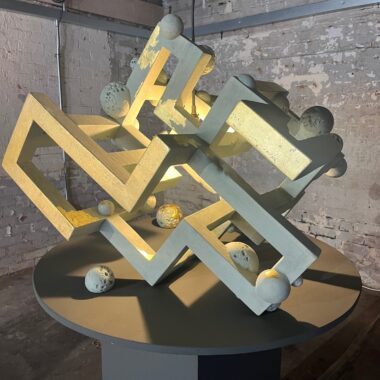Rare Earth Rising
Stoke-on-Trent
ST4 1BU Find out more
Location: Space B
Awarded Commission 2025
Winner of the BCB Award Prize in 2023, Mella Shaw returns to present a new body of work. Continuing her environmental focus, Mella is drawing attention to the urgent issue of mineral depletion and deep-seabed mining. The debate over how – and at what cost – we can access the quantities of rare elements and heavy metals that the green revolution requires is a rapidly evolving area with far-reaching repercussions.
Rare Earth Rising
Lying on the ocean bottom, 5,000 metres below the surface but otherwise easily harvestable, lies a source of rare earth elements and materials such as lithium, cobalt, nickel and manganese. These potato-sized polymetallic nodules have taken millennia to form and are sitting there seemingly waiting to be gathered from what are the most pristine and untouched habitats on the globe.
Incorporated into her work, Mella has used clay sourced from the deep-sea bed at the bottom of the South Pacific Ocean at a site rich in polymetallic nodules. This clay was donated by SMARTEX, a research project gathering data that shows how destructive this form of mining will be. Mella has also used gold leaf taken from recycled sources, drawing attention to the futility of mining for new material when there is already enough in circulation, which is not thrown away in millions of tonnes of e-waste every year.
The installation of large hand-built structures and dramatic lighting invites us to consider the ethics and impact of harvesting polymetallic nodules and their devastating effect on marine life and carbon absorption. The forms utilise lithium, cobalt, manganese and copper, all materials that – as well as being central to this debate – also have a long history in ceramics. Mella’s work asks us if this is the treasure it first appears to be – or are we sleepwalking into another climate catastrophe?
This work has been part-funded by the Henry Rothschild Ceramic Bursary.

